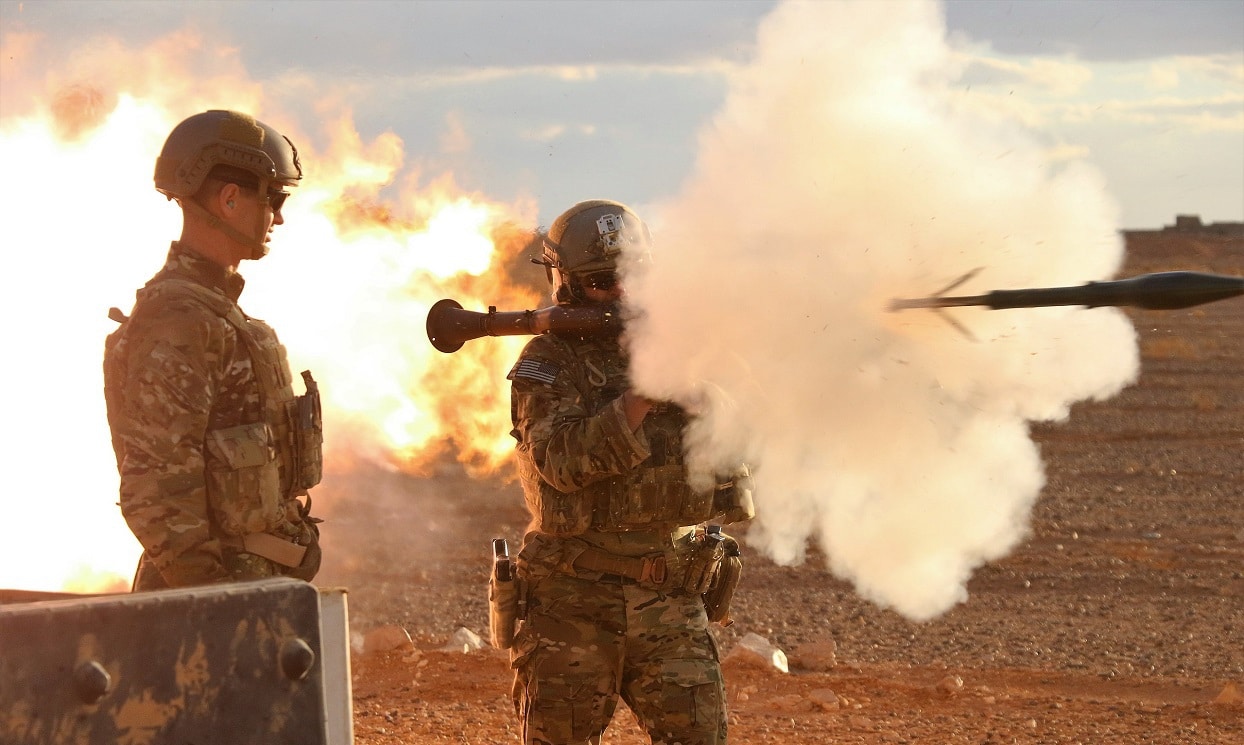TAIPEI, TAIWAN—The Pentagon’s calendar is replete with regular military exercises. Every two years, for example, thousands of American military personnel from almost every service branch descend on Egypt for Bright Star. What began in 1980 with Egyptian, American, and a few Sudanese troops rubbing elbows, today includes 20 other countries from across the Middle East, Eastern Mediterranean, and Africa.
For two weeks every year, the Pentagon organized Eager Lion in Jordan, military exercises that also bring together contingents from across Europe, the Middle East, and Australia. African Lion, meanwhile, brings nearly 8,000 troops to Morocco from not only the United States, but also other African contingents, former colonial powers, and Brazil. The United States also traditionally conducted joint exercises with South Korea—this year saw the first U.S.-South Korean military exercise since the Trump administration ended these as a concession to North Korea.
For the sake of security not only in Africa, but also in Asia, it is time to consider a new series of annual military exercises for the Horn of Africa in Somaliland.
The reasons are many: Somaliland controls more than 500 miles of coast along the Gulf of Aden; it is prime real estate to counter weapons smuggling between Yemen and Somaliland proper and important to the defense of the Bab-el-Mandeb, one of the world’s great strategic chokepoints. While piracy off Somalia has declined precipitously over the past decade, it is important to continue to drill to maintain counter-piracy capabilities.
Somaliland is also important given the vulnerability of neighboring Djibouti to Chinese pressure. Djibouti, where both the United States and the People’s Liberation Army Navy maintain bases, is the world’s most indebted country to China. Should China leverage its position to force the United States out of Camp Lemonnier, it will be essential for U.S. regional operations that it can relocate quickly to Berbera, Somaliland. Military exercises, for example, could ensure that U.S. destroyers and other ships can dock at Berbera’s newly renovated deep-water port and U.S. pilots are familiar with the Berbera airfield.
The utility of such exercises would not limit themselves to African forces, however. Somaliland shot to White House attention when it spurned mainland China and, for principle’s sake, cast its lot with Taiwan. While Taiwan holds its own annual military exercises to augment readiness in case of Chinese invasion, the country’s isolation takes a toll. There is some minor U.S. training for Republic of China forces, but nothing close to what Taiwan needs given the threats it faces. As it has now been more than 40 years since the United States switched recognition from Taiwan to the People’s Republic of China, even the most junior officers who once trained with their American counterparts are retired. Taiwan’s increasing defense budget reflects that Taipei is now more serious about its defense than in past years, even if its acquisition of ships over missiles is misguided given the nature of the threat the country faces. Still, there is no substitute for training.
Here, Somaliland provides a unique opportunity to advance American national security in both Africa and Asia. Taiwanese and American forces could work and drill together, and Taiwan would also have much to teach the coast guards of Somaliland and perhaps other African countries who chose to participate.
More From 19FortyFive
Department of Defense: Russia’s PAK DA Stealth Bomber Will Never Fly
Iran to Send More Drones and Missiles to Russia
Is Russia Considering Using Tactical Nuclear Weapons?
At present, the State Department’s Bureau of African Affairs is reticent about cooperation with the Horn of Africa’s only democracy for fear of angering Somali politicians in Mogadishu, but even Von Batten-Montague-York, Somalia’s lobbyist in Washington, last year called Somaliland “Africa’s most promising state” while quipping Somalia “perpetually teeters on the brink of state failure.” While inertia and tunnel-vision may rule the Bureau, increasing numbers of policymakers in the Pentagon, U.S. Africa Command, and Congress recognize that the “only-Mogadishu” approach does not serve U.S. interests. After all, what happens in East Africa does not stay in East Africa: It ties directly to U.S. interests in East Asia.
It is time the White House and Pentagon greenlight U.S. and Taiwan exercises in the Horn of Africa.
Now a 1945 Contributing Editor, Dr. Michael Rubin is a Senior Fellow at the American Enterprise Institute (AEI). Dr. Rubin is the author, coauthor, and coeditor of several books exploring diplomacy, Iranian history, Arab culture, Kurdish studies, and Shi’ite politics, including “Seven Pillars: What Really Causes Instability in the Middle East?” (AEI Press, 2019); “Kurdistan Rising” (AEI Press, 2016); “Dancing with the Devil: The Perils of Engaging Rogue Regimes” (Encounter Books, 2014); and “Eternal Iran: Continuity and Chaos” (Palgrave, 2005).
Want More 19FortyFive articles, news, and analysis on the top military, defense, national security, as well as politics and economics news? Make sure to follow us on Google News, Flipboard, YouTube, Facebook, Twitter, and Linkedin. Also, please don’t forget to sign up for our newsletter here. You can also find our code of publishing ethics and standards here.

